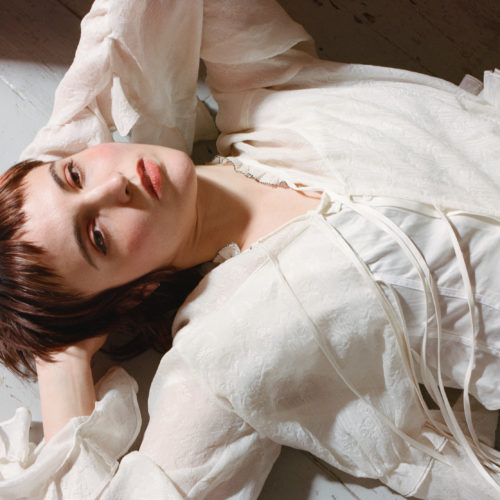
Late Slap
—
Out April 05, 2024
—
Full Time Hobby



There’s a party in Dana Gavanski’s head and everyone’s invited – well, kind of. Late Slap, Gavanski’s third album, gives voice to the highs and lows of the mindscape in all its joys and terrors, injecting some much needed playfulness into the process of writing about emotionally hard things. “The album holds together the seemingly disparate aspects of my character that I have sometimes tried to repress,” says Dana. “With this album I’m letting them into the room, celebrating them for all their strangeness – a strangeness which I think we all, on some level, share.”
Having (literally) lost her voice during the writing of her previous album, When It Comes, Late Slap finds Dana in magisterial mode, displaying a newfound confidence and energy—in both her writing and singing—borne, paradoxically, from embracing feelings of discomfort. “I realized,” says Dana, “that in order to become stronger I needed to get used to being uncomfortable.” It’s appropriate, then, that the album opens with ‘How to Feel Uncomfortable,” a quick sonic punch of a song, which bemoans the growing distances between people in the digital landscapes where we spend so much time wandering aimlessly: “stand too close, face in your phone/ it’s scrambling your mind/ tired of your zombie glow/soaking up your eyes.”. The song attests to the difficulty of sitting with yourself, in boredom, insecurity and indecision—and the important emotional and spiritual rewards of doing so. Or, as Susan Sontag, a major influence on the album, puts it in “Regarding the Pain of Others: “It is passivity that dulls feeling. The states described as apathy, moral or emotional anesthesia, are full of feelings; the feelings are rage and frustration…”
In the writing of Late Slap, Gavanski swapped out the familiar for the new, training herself to use Logic Pro rather than just her usual guitar-and-voice approach. If composing somewhat neo-Luddite anthems on a Macbook seems a little contradictory, well, that’s kind of the point: “21st century life is so full of contradictions and headfucks that it can be hard to do anything with conviction—you could cynic your way out of doing or believing anything.” Initially overwhelmed by its seemingly limitless possibilities, Dana began to create demos and collages of small sound worlds across various influences, at times orchestral pop, art rock and new wave, again embracing difference and variety. “Whenever I’m stuck in a certain way of working, it helps to try something new, to challenge myself in a different way. Like when you learn a new instrument: you’re excited by it and less concerned with perfection.”
Gavanski fleshed out the demos with her band before taking the album—and the band—to Mike Lindsay (Tunng, LUMP) at MESS, the producer’s studio in Margate. The five-piece, which includes Gavanski’s fellow co-producer James Howard (Rozi Plain, Alabaster dePlume), tracked the record over five days. “I knew Mike could help me find the range of sound I was looking for; he has an amazing attention to sonic detail and we’ve worked well together on previous records.” Lindsay acquired a Yamaha DX7 synth at Dana’s request just for the album, and they used it to conjure an atmosphere of digital warmth that recalls the Beverly Glenn-Copeland’s meditative masterpiece Keyboard Fantasies.
But the Gavanski mind-party has a varied playlist. ‘Ears Were Growing,’ for example, encapsulates the eighties zeal of Talking Heads or Klaus Nomi, pitching fantasy against reality through a playful lyric about negative self-talk, the domestic interior, and their way of creating a kind of Stockholm Syndrome equal parts comfort and fear. The line “take me to the cinema/ I want to inhabit the actress!” testifies to Dana’s appreciation for the theatrical and the cinematic. She cites the influence of golden age Hollywood star Gena Rowlands, whose portrayal of an aging theatre actor in Opening Night leads to a frightening loss of self and a dark, sobering transformation: “Gena manages to express so many feelings just through her face. She’s strikingly beautiful in a classic Hollywood way but she’s not scared to look silly and childish. She makes me laugh and cry at the same time—there’s something transformative in going over the top.”
Some tracks take a less in-your-face approach (it takes all sorts to make a memorable party). ‘Ribbon,’ a tender song about the recent loss of a childhood friend, looks at the world through the lens of grief, marveling at the way the familiar suddenly loses its meaning and shape: “To face the rays all saddled in silence/How do I rearrange my room/ the walls are a shell/That’s opened too soon/ I can’t manage it from here.” The gently propulsive ‘Song for Rachel’ approaches the same subject matter from another angle, finding release in the simple, straight-to-the-point chorus refrain of “Cause’ you’re gone/ it’s just that I’m lost/ and I don’t know how to feel.” Not knowing how to feel, Gavanski shows us, is as valid and important a feeling as any other.
Late Slap’s unsettling artwork places the album themes in plain sight, Gavanski’s ambiguous, animated expression and screened-out black eyes bearing witness to what might be a revolving exhibition of contradictory images: cute play-fighting kittens giving way to pictures of suffering and war, golden hours dissolving into lost hours never to be reclaimed. But Late Slap is also what its title suggests—a sudden jolt, a shock to the system that seeks to reconnect with the messy flesh-and-thought humanity of simply being human. The album’s tension between cynicism and trust, openness and despair, melodrama and silliness, ultimately invites the listeners in (throw your coat on the bed over there, stranger). It welcomes you at the door, and beckons you to find tenderness in a world doing its best to desensitize us.